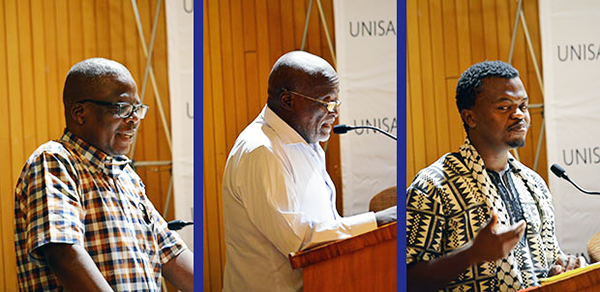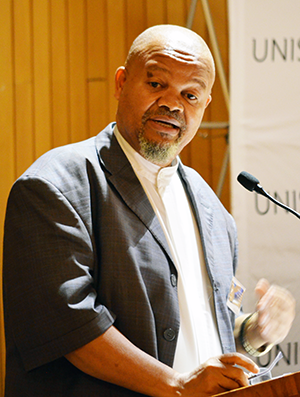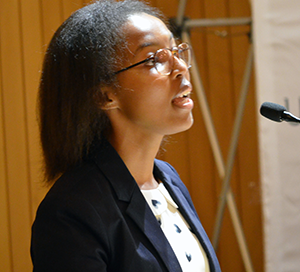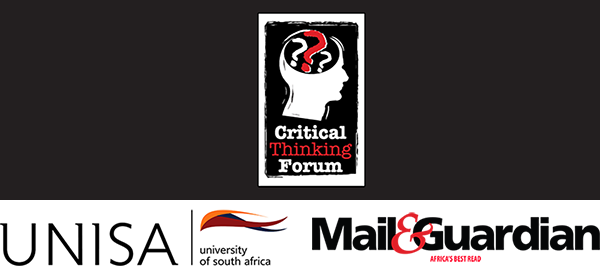

Speakers: Prof. Sabelo Ndlovu-Gatsheni (Director of Scholarship: Change Management Unit, Unisa), Wonga Tabata (Deputy Director: Social Inclusion and Equity, DHET), and Ntando Sindane (Postgraduate research assistant: CLAW)
Jointly presented by the Mail & Guardian and Unisa, a critical thinking forum on 8 November 2017 examined social inclusion, anti-racism and re-humanising higher education. The evening focused on social inclusion which, like social justice, is at the heart of the transformation and decolonialisation debates in higher education and the policy environment.
Social inclusion embraces democratic citizenship, the right to dignity, combating racism and challenging inequality in all its manifestations and expressions. Re-humanising the university, on the other hand, is essentially about decolonising its ways and Africanising its character to match its context. This entails allowing students to own the space by recognising their own experiences in curricula, and to participate on their own terms.
Professor Sabelo Ndlovu-Gatsheni, Director of Scholarship in Unisa’s Change Management Unit, said that the cause of the problem of inclusion and exclusion can be traced back to when humanity was initially socially and hierarchically classified along racial lines. ‘This was essentially the colonisation of being,’ he said. ‘The denial of other people being human was done for the purposes of enslavement and colonisation. The issue of inclusion and exclusion can therefore not be depoliticised. Those who have been denied humanity first of all must enjoy restitution.’

In his opening remarks Professor Mandla Makhanya (Principal and Vice-Chancellor: Unisa) said that raising awareness of the issues under discussion is not enough. ‘We must also raise critical consciousness on inequity, power, privilege and oppression as these occur in many universities,’ he said. ‘We need to invite African ideas into this discussion and, within the university, continue working towards social and cultural inclusivity, as well as sustainability, through intellectual networking, epistemic justice and environmental ethics.’
Commenting on the implications for higher education, Ndlovu-Gatsheni said that when one denies that someone is human, one also denies that he or she has knowledge. ‘So there is a definite link between the epistemological question and the ontological question,’ he said. ‘With today’s topic, and the fact that we are talking about it, we are acknowledging that the domain of higher education is also a domain of re-humanising. Universities were, on many levels, complicit in the process of dehumanising.’
Ndlovu-Gatsheni proceeded to discuss a number of strategies for re-humanising higher education, including the restoration of Africa as a legitimate epistemic site of knowledge. ‘African knowledge must be taken as a departure point rather than a peripheral consideration,’ he said.
Wonga Tabata, Deputy Director of Social Inclusion and Equity at the Department of Higher Education and Training discussed the department’s policy framework for social inclusion in higher education, which was gazetted in December 2016. He explained that the Policy Framework for the Realisation of Social Inclusion in Post-School Education and Training (PSET) Institutions intends to assist post‐school education and training institutions in the implementation of social inclusion and to provide a monitoring instrument to the Department of Higher Education and Training to ensure that the social inclusion priorities of the DHET are taken into account in all PSET institutions.
Through this policy framework, the department is creating an enabling environment for social inclusion in post-school education and training that will ensure that social inclusion-related policies and legislation in institutions are developed, implemented and monitored. The policy framework complements various international and national policies to enhance human dignity and affirm the Bill of Rights entrenched in the Constitution of the Republic of South Africa.

Providing context Nompumelelo Runji (policy analyst and author), said that inequality remains the biggest threat to the gains of the past decades. ‘Part of this inequality is elevating Eurocentric ontologies and epistemologies above African ones in the academic environment,’ she said.
Ntando Sindane, postgraduate research assistant in the College of Law, recounted his frustration as a student encountering only Eurocentric views and authors. To rectify this imbalance, he said, white thinkers need to be relegated to secondary sources, and replaced with black African intellectuals as primary sources. Secondly, he said, the curriculum must be changed. ‘Not only the content,’ said Sindane, ‘but also the matter of how we teach, how we learn, how we gather information.’
Sindane contended that the student must be seen as a bearer of information, and not merely an empty vessel to be filled with knowledge imparted by professors. Turning to the under-resourcing of African language development, Sindane said that universities should close their departments of English and Afrikaans, and use those resources to empower African languages.
The evening concluded with vigorous participation from the floor, with all the participants being required either to defend their points of view or to answer searching questions.
*By Philip van der Merwe

Publish date: 2017-11-13 00:00:00.0